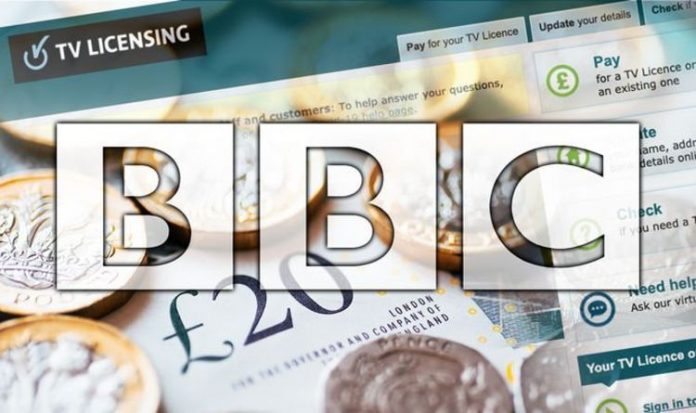Figures obtained by Express.co.uk reveal that the total cost of gathering the £157.50 levy will increase by around £38 million this year. The huge rise is accounted for by the extra cost of implementing plans to scrap free licences for the over-75s. Pensioner groups and public spending campaigners last night attacked the “fool’s logic” of paying private collection firm Capita to chase the fees.
Hundreds of older viewers are refusing to pay the fee and activists are threatening a civil disobedience campaign in support.
It comes as Prime Minister Boris Johnson is planning a major shake up of the BBC that could lead to the TV licence fee being scrapped.
The Prime Minister told MPs this week that Government will soon publish a “roadmap for reform” of the broadcaster.
The latest furore came as new director general Tim Davie yesterday (thurs) told staff he planned to slim down the flagship broadcaster and adopt a broader outlook.
Executives have also been under-fire following the aborted plan to drop Rule, Britannia! and Land of Hope and Glory from this year’s Last Night of the Proms.
Dennis Reed, director of Silver Voices, said: “It is a disgrace. Whether it is £100 million or £40 million, that is a lot of money which could be spent providing free licences for vulnerable over-75s.
“It is a false economy – fool’s logic. Instead of using it to provide a service to deserving people, they are paying informers to go round harassing them.”
Anti-licence campaigner Caroline Levesque-Bartlett, said: “If they have already injected an extra £38milion, there is not a lot to show for it.
“Their website is regularly down, the letter for the over 75 is not ready and no one seems to ever pick up the phone.
“The whole thing is so shambolic, it would almost be comical if it wasn’t for the fact that TV licences are a criminal matter.”
JUST IN: Brexiteer Rupert Lowe makes symbolic donation to Defund BBC campaign
An additional £42.7million is being spent on other collection costs, including communications, postage for reminders to non-payers and licence fee modernisation.
Figures for the last five years reveal that the corporation usually spends about two-thirds of its annual fee collection bill to Capita.
The sum includes call centres, the firm’s “field force”, detection and over-the-counter services.
Three years ago, Capita was widely criticised for using aggressive door-to-door tactics and paying staff hefty bonuses of up to £15,000.
The controversy led to the resignation of the firm’s £2.7million-a-year boss Andy Parker a month later.
Campaigner Caroline Levesque-Bartlett pointed out that it cost £102million to collect 21.1million TV licences last year, and asked why over a third is needed in additional funding to collect an extra 3.1million licences, the number of pensioners who now have to start paying the annual charge.
The campaigner said: “That extra sum £38million is not negligible, it represents nearly 40 per cent of last year’s total collection budget. It’s the equivalent of 241,269 TV licences.
“It’s also a questionable expense as the whole system relies on people willingly buying a TV licence.”
But the BBC has insisted no over-75s without a TV licence would be visited by enforcement officers and no on-the-spot payments would be taken during a transition period.
The length of the transition phase has not been specified.
A TV Licensing spokesperson said: “TV Licensing must ensure those who need a licence has one and costs are kept to a minimum at around 3p for every pound collected.
“The National Audit Office found that TV Licensing has reduced collection costs demonstrating our continued efficiency.”
They also pointed out collection costs as a percentage of revenue collected has more than halved since TV Licensing took over from the Home Office in 1991.
Additional reporting by Cyril Dixon







